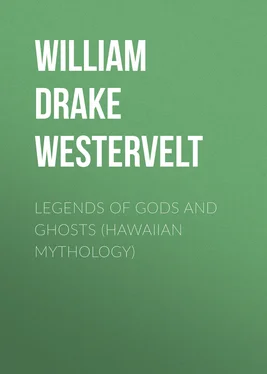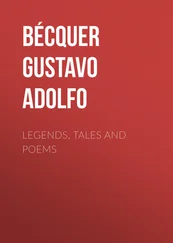William Drake Westervelt - Legends of Gods and Ghosts (Hawaiian Mythology)
Здесь есть возможность читать онлайн «William Drake Westervelt - Legends of Gods and Ghosts (Hawaiian Mythology)» — ознакомительный отрывок электронной книги совершенно бесплатно, а после прочтения отрывка купить полную версию. В некоторых случаях можно слушать аудио, скачать через торрент в формате fb2 и присутствует краткое содержание. Жанр: foreign_antique, Старинная литература, Мифы. Легенды. Эпос, на английском языке. Описание произведения, (предисловие) а так же отзывы посетителей доступны на портале библиотеки ЛибКат.
- Название:Legends of Gods and Ghosts (Hawaiian Mythology)
- Автор:
- Жанр:
- Год:неизвестен
- ISBN:нет данных
- Рейтинг книги:3 / 5. Голосов: 1
-
Избранное:Добавить в избранное
- Отзывы:
-
Ваша оценка:
- 60
- 1
- 2
- 3
- 4
- 5
Legends of Gods and Ghosts (Hawaiian Mythology): краткое содержание, описание и аннотация
Предлагаем к чтению аннотацию, описание, краткое содержание или предисловие (зависит от того, что написал сам автор книги «Legends of Gods and Ghosts (Hawaiian Mythology)»). Если вы не нашли необходимую информацию о книге — напишите в комментариях, мы постараемся отыскать её.
Legends of Gods and Ghosts (Hawaiian Mythology) — читать онлайн ознакомительный отрывок
Ниже представлен текст книги, разбитый по страницам. Система сохранения места последней прочитанной страницы, позволяет с удобством читать онлайн бесплатно книгу «Legends of Gods and Ghosts (Hawaiian Mythology)», без необходимости каждый раз заново искать на чём Вы остановились. Поставьте закладку, и сможете в любой момент перейти на страницу, на которой закончили чтение.
Интервал:
Закладка:
VII
The story of the shark-god Kauhuhu has been told under the legend of "Aikanaka (Man-eater)," which was the ancient name of the little harbor Pukoo, which lies at the entrance to one of the beautiful valleys of the island of Molokai. The better way is to take the legend as revealing the great man-eater in one of his most kindly aspects. The shark-god appears as the friend of a priest who is seeking revenge for the destruction of his children. Kamalo was the name of the priest. His heiau, or temple, was at Kaluaaha, a village which faced the channel between the islands of Molokai and Maui. Across the channel the rugged red-brown slopes of the mountain Eeke were lost in the masses of clouds which continually hung around its sharp peaks. The two boys of the priest delighted in the glorious revelations of sunrise and sunset tossed in shattered fragments of cloud color, and revelled in the reflected tints which danced to them over the swift channel-currents. It is no wonder that the courage of sky and sea entered into the hearts of the boys, and that many deeds of daring were done by them. They were taught many of the secrets of the temple by their father, but were warned that certain things were sacred to the gods and must not be touched. The high chief, or alii, of that part of the island had a temple a short distance from Kaluaaha, in the valley of the harbor which was called Aikanaka. The name of this chief was Kupa. The chiefs always had a house built within the temple walls as their own residence, to which they could retire at certain seasons of the year. Kupa had two remarkable drums which he kept in his house at the heiau. His skill in beating his drums was so great that they could reveal his thoughts to the waiting priests.
One day Kupa sailed far away over the sea to his favorite fishing-grounds. Meanwhile the boys were tempted to go to Kupa's heiau and try the wonderful drums. The valley of the little harbor Aikanaka bore the musical name Mapulehu. Along the beach and over the ridge hastened the two sons of Kamalo. Quickly they entered the heiau, found the high chief's house, took out his drums and began to beat upon them. Some of the people heard the familiar tones of the drums. They dared not enter the sacred doors of the heiau, but watched until the boys became weary of their sport and returned home.
KUKUI-TREES, IAO VALLEY, MT. EEKE
When Kupa returned they told him how the boys had beaten upon his sacred drums. Kupa was very angry, and ordered his mu, or temple sacrifice seekers, to kill the boys and bring their bodies to the heiau to be placed on the altar. When the priest Kamalo heard of the death of his sons, in bitterness of heart he sought revenge. His own power was not great enough to cope with his high chief; therefore he sought the aid of the seers and prophets of highest repute throughout Molokai. But they feared Kupa the chief, and could not aid him, and therefore sent him on to another kaula, or prophet, or sent him back to consult some one the other side of his home. All this time he carried with him fitting presents and sacrifices, by which he hoped to gain the assistance of the gods through their priests. At last he came to the steep precipice which overlooks Kalaupapa and Kalawao, the present home of the lepers. At the foot of this precipice was a heiau, in which the great shark-god was worshipped. Down the sides of the precipice he climbed and at last found the priest of the shark-god. The priest refused to give assistance, but directed him to go to a great cave in the bold cliffs south of Kalawao. The name of the cave was Anao-puhi, the cave of the eel. Here dwelt the great shark-god Kauhuhu and his guardians or watchers, Waka and Mo-o, the great dragons or reptiles of Polynesian legends. These dragons were mighty warriors in the defence of the shark-god, and were his kahus, or caretakers, while he slept, or when his cave needed watching during his absence.
Kamalo, tired and discouraged, plodded along through the rough lava fragments piled around the entrance to the cave. He bore across his shoulders a black pig, which he had carried many miles as an offering to whatever power he could find to aid him. As he came near to the cave the watchmen saw him and said:–
"E, here comes a man, food for the great [shark] Mano. Fish for Kauhuhu." But Kamalo came nearer and for some reason aroused sympathy in the dragons. "E hele! E hele!" they cried to him. "Away, away! It is death to you. Here's the tabu place." "Death it may be—life it may be. Give me revenge for my sons—and I have no care for myself." Then the watchmen asked about his trouble and he told them how the chief Kupa had slain his sons as a punishment for beating the drums. Then he narrated the story of his wanderings all over Molokai, seeking for some power strong enough to overcome Kupa. At last he had come to the shark-god—as the final possibility of aid. If Kauhuhu failed him, he was ready to die; indeed he had no wish to live. The mo-o assured him of their kindly feelings, and told him that it was a very good thing that Kauhuhu was away fishing, for if he had been home there would have been no way for him to go before the god without suffering immediate death. There would have been not even an instant for explanations. Yet they ran a very great risk in aiding him, for they must conceal him until the way was opened by the favors of the great gods. If he should be discovered and eaten before gaining the aid of the shark-god, they, too, must die with him. They decided that they would hide him in the rubbish pile of taro peelings which had been thrown on one side when they had pounded taro. Here he must lie in perfect silence until the way was made plain for him to act. They told him to watch for the coming of eight great surf waves rolling in from the sea, and then wait from his place of concealment for some opportunity to speak to the god because he would come in the last great wave. Soon the surf began to roll in and break against the cliffs.
Higher and higher rose the waves until the eighth reared far above the waters and met the winds from the shore which whipped the curling crest into a shower of spray. It raced along the water and beat far up into the cave, breaking into foam, out of which the shark-god emerged. At once he took his human form and walked around the cave. As he passed the rubbish heap he cried out: "A man is here. I smell him." The dragons earnestly denied that any one was there, but the shark-god said, "There is surely a man in this cave. If I find him, dead men you are. If I find him not, you shall live." Then Kauhuhu looked along the walls of the cave and into all the hiding-places, but could not find him. He called with a loud voice, but only the echoes answered, like the voices of ghosts. After a thorough search he was turning away to attend to other matters when Kamalo's pig squealed. Then the giant shark-god leaped to the pile of taro leavings and thrust them apart. There lay Kamalo and the black pig which had been brought for sacrifice.
Oh, the anger of the god!
Oh, the blazing eyes!
Kauhuhu instantly caught Kamalo and lifted him from the rubbish up toward his great mouth. Now the head and shoulders are in Kauhuhu's mouth. So quickly has this been done that Kamalo has had no time to think. Kamalo speaks quickly as the teeth are coming down upon him. "E Kauhuhu, listen to me. Hear my prayer. Then perhaps eat me." The shark-god is astonished and does not bite. He takes Kamalo from his mouth and says: "Well for you that you spoke quickly. Perhaps you have a good thought. Speak." Then Kamalo told about his sons and their death at the hands of the executioners of the great chief, and that no one dared avenge him, but that all the prophets of the different gods had sent him from one place to another but could give him no aid. Sure now was he that Kauhuhu alone could give him aid. Pity came to the shark-god as it had come to his dragon watchers when they saw the sad condition of Kamalo. All this time Kamalo had held the hog which he had carried with him for sacrifice. This he now offered to the shark-god. Kauhuhu, pleased and compassionate, accepted the offering, and said: "E Kamalo. If you had come for any other purpose I would eat you, but your cause is sacred. I will stand as your kahu, your guardian, and sorely punish the high chief Kupa."
Читать дальшеИнтервал:
Закладка:
Похожие книги на «Legends of Gods and Ghosts (Hawaiian Mythology)»
Представляем Вашему вниманию похожие книги на «Legends of Gods and Ghosts (Hawaiian Mythology)» списком для выбора. Мы отобрали схожую по названию и смыслу литературу в надежде предоставить читателям больше вариантов отыскать новые, интересные, ещё непрочитанные произведения.
Обсуждение, отзывы о книге «Legends of Gods and Ghosts (Hawaiian Mythology)» и просто собственные мнения читателей. Оставьте ваши комментарии, напишите, что Вы думаете о произведении, его смысле или главных героях. Укажите что конкретно понравилось, а что нет, и почему Вы так считаете.











